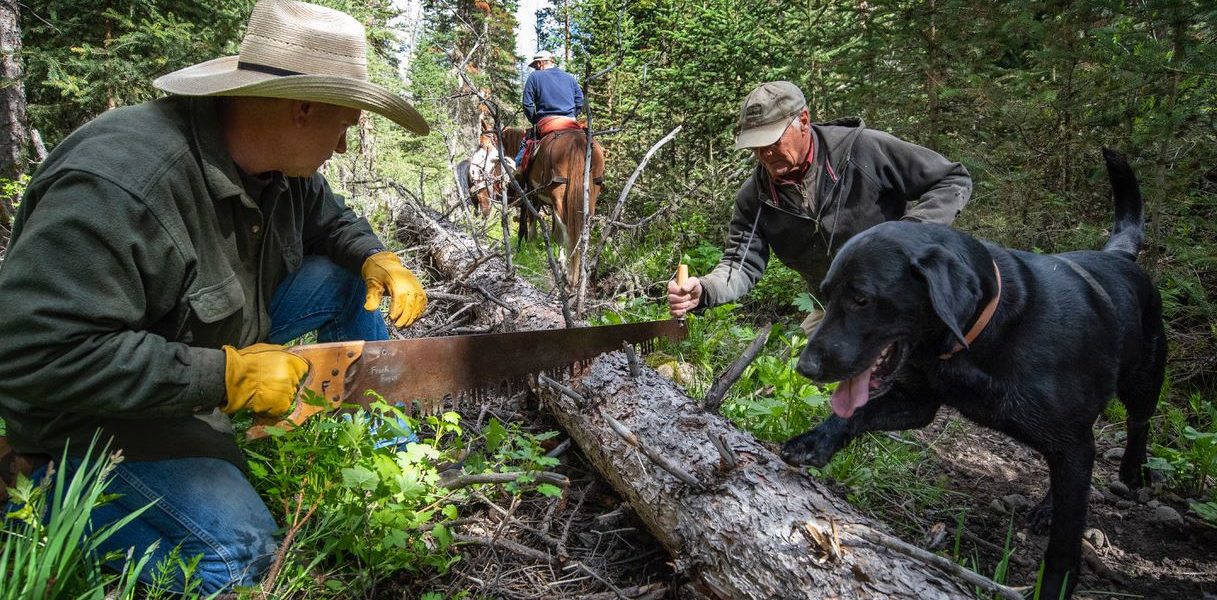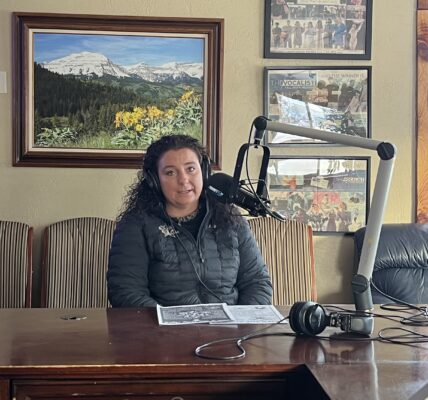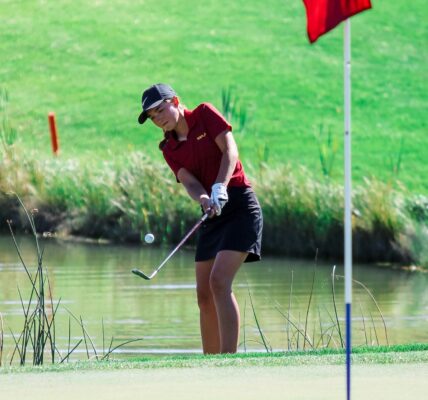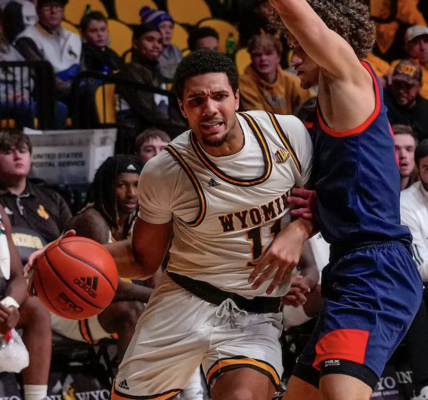By Mark Davis
Powell Tribune
Via Wyoming News Exchange
POWELL — With storms threatening Sunday, a half-dozen horsemen loaded their saddle bags and panniers with serious looking saws, lunches of canned sardines and jerky, and rain slickers. They climbed aboard their steeds and headed west into the North Absaroka Wilderness.
Through rushing Sunlight Creek, canyons lined by yellow stone buttes and meadows blooming with Indian paintbrush and deadly, but beautiful larkspur, the horsemen rode for hours, searching for obstructions on the trail. They had been here before — the mostly clear path leads between a myriad of cut tree trunks and brush, cleared by hand by the crews in years past.
It’s hard to imagine the commitment it takes to keep a trail open, but that’s the resolve of a small group of area community servants: the Shoshone Back Country Horsemen. One of the busiest chapters in the U.S., the well-seasoned volunteers have cleared thousands of miles of trails in the Shoshone National Forest one obstruction at a time. But Little Sunlight Trail is designated as wilderness, so the group had to go old school.
No chain saws were available to slice through the cedars, cottonwoods and other snags of the lush riparian path. Rather long hand saws, some antiques, salvaged over the years from estate sales and second-hand shops, were transported in custommade scabbards between snags.
For Bruce and Bryce Fauskee, the trip was just another day. Bruce has been with the organization since its inception more than 25 years ago. He put his son Bryce on the back of his first horse before he was 2 and the pair, along with the rest of the family, have been enjoying the backcountry since. Born with myelomeningocele spina bifida, Bryce has been in a wheelchair as long as he can remember — that is, when not on the back of a horse.
Called open spina bifida, at birth the spinal canal is open along several vertebrae in the lower or middle back. The membranes and spinal nerves push through this opening, forming a sac on the infant’s back, typically exposing tissues and nerves, according to the Mayo Clinic. Complications can be fatal. For Bryce it meant “endless complications” at birth, his father said, and the loss of the use of his legs.
The Fauskees are tough and weren’t about to let Bryce’s disability get in their way of fun and community service.
“We never really thought about putting him on a horse. We just did it,” Bruce said. “[Bryce] does whatever he can, which is a lot.”
Few have put in as many miles in the saddle in grizzly territory as the Fauskee family. Fewer yet have made the commitment while paralyzed. “It’s pretty fun. You get to go a lot of places you couldn’t go any other way,” Bryce said.
Bryce’s commitment to navigating the outdoors took a big step recently with the purchase of an action track wheelchair that can take him into the wild. It also gives him independence. This past spring Bryce went on his first solo hunt, harvesting a turkey near Powell.
The 2003 Powell High School grad credits his father for his life filled with adventure.
“There’d be no way in hell I could do this without dad. He does everything with the horses and gives me a boost up,” Bryce said. But Bryce isn’t just along for the ride. “Bryce usually climbs off his horse and works. That’s why he likes to come along,” Bruce said.
Not surprising, Bryce has great arm strength and is handy with a saw.
Bruce has two sons and two grandsons and they all have pitched in to help the Back Country Horsemen. Not only are they giving back to their community, they’re having a blast doing so, the Fauskee patriarch said. “It’s a good thing to spend time with your kids.”
Trail boss of the work day down Little Sunlight Trail was long-time volunteer Frank Fagan, of Powell. He’s inspired by all of those willing to join in to help keep trails through the national forest clear during their free time. While the club brings in money through donations and a contract to clear at least 100 miles of trail a year, all money brought in by the club is spent building corrals, refurbishing infrastructure and buying tools for the work.
“We don’t use any of the [donations] getting out here. The care of the horses, our tack, and our gas and expenses is on us,” Fagan said.
The commitment of member volunteers is a source of pride for Fagan. He was prepared for a tough day as the creek wends through thick woods. But as the crew proceeded, they found they’d had help. Someone had come through earlier in the year — probably horn hunters, he thought — and cleared much of the path. “We appreciate the help, but we need to keep it legal.”
There are strict regulations on equipment that can be used in areas designated as wilderness. Motorized vehicles and tools are strictly forbidden. The crew can’t even bring a battery-powered drill to help put up signs.
Dan Barngrover, of Powell, was on his first trip with the group. He’s spent time on his own and with friends to clear trails and is considering joining the horseback gang of volunteers. The organization is looking for some new blood to join the fun.
“They’re looking for members younger than me, I bet,” Barngrover joked.
All are welcome, Fagan said. The group recently solicited volunteers while working a booth at Jake Clark’s Mule Days celebration, though “we didn’t sign up a single volunteer,” he said.
Like most non-governmental organizations, finding young members willing to serve their communities is an increasingly difficult task. Many of the volunteers in the Back Country Horsemen are retirement age and they need some fresh, strong backs to assist with the important work.
“Many of the trails would close without us,” Fagan said. “It’s rewarding riding back out and seeing a tree you cleared just a couple hours earlier. You work your ass off to get to the end of the trail and then get to turn around and enjoy yourself on the way home.”
It’s not all work for the crew. The group holds two fun rides a year and recently had its biggest turnout, 22 riders joining the ride. But even on work days, laughter breaks the quiet of the wilderness through most of the day.





